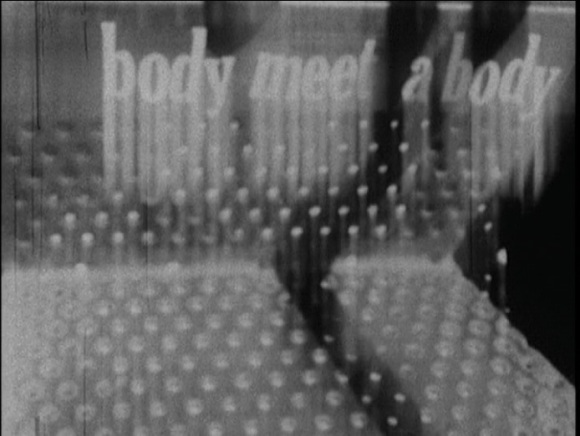Each year, Q&A panels at the Visions Film Festival & Conference display an impressive diversity of approaches to filmmaking, while the festival screenings reflect a range of filmmaking techniques. Few branches of cinema are as difficult, expressive, or, in some cases, inaccessible, as experimental filmmaking, but Jing Niu's "Man is Always on the Stairs" makes a strong case for the creative prevalence of experimental filmmaking in undergraduate programs. Featured in the 2012 Visions Film Festival & Conference, "Man Is Always On the Stairs" is a strange, divisive, and wholly unique experience.

The film begins with a challenging opening sequence, involving a screen of static which could cause one to wonder if he or she is experiencing technical difficulties. Soon the voice of little girl chimes in and small pair of feet step up a flight of stairs. These stairs have printed on them lines from the Robert Burns poem “Comin’ thro the rye”. The last act of the film involves a field of rye, a light, and two crawling naked bodies, the combination of which I couldn't do justice by describing. These sequences are precisely experimental in nature in that they experiment not only with film technique and aesthetics, but with expectations and filmic structure. What does it all add up to? The refreshment of experimental film viewing is in interpretation. A viewer could have a thousand guesses that could all be right or wrong.
I had the pleasure of asking the filmmaker herself about the inspiration behind "Man is Always on the Stairs," as well as the filmmaking experience and the film's reception. Here's what she had to say:
Joey Powell (JP): What kind of approach do you take when it comes to experimental filmmaking and what excites you most about the format?
Jing Niu (JN): I think what’s really exciting about experimental filmmaking is the opportunity to play with the fact that it was and still is a very bourgeois genre. It’s really interesting how we can subvert this kind of classist form of “high art” and kind of turn it’s history around. Right now, I’m asking a lot of questions about what it means to be an experimental filmmaker. I remember the first time that I made a video-project by myself; I had no idea that the genre of experimental even existed! But when I showed it to my classmates and teachers, they were like “oh, yeah that’s an experimental film for sure, and you’re an experimental filmmaker for sure." As loaded as its history is, there is a lot of potential for the poetics of experimental film to grow and for it to merge with other forms. In my opinion, experimental filmmaking can include art films, documentary films, and poetic films. You could say that I identify more as a non-fiction filmmaker than an experimental filmmaker.
JP: What was the inspiration behind “Man is Always on the Stairs?” Is there anything you would like to say about the structure, themes, or tone?
JN: The film is based on a painting by Francis Bacon titled “Man Kneeling in Grass”. This painting had always resonated with me. In the painting, you can see someone opening a door onto a darkened field, in the center of which kneels a naked figure. For me it depicted a psychological hell where men are lone bodies in an endless field. It reminded me of one of my favorite poems “Comin’ thro the rye” by Robert Burns. You know… that poem in Catcher in the Rye by JD Salinger? The poem from the story goes, “ A poor wet body, she’s seldom dry. She drenched her petticoat coming thro the rye…. When a body meet a body, need a body cry?” That last phrase about how sensitive we are to the tactile touch and emotional stench of another human being really resonated with me, and was the feeling that I was going for. In the film, you become aware of another human being grazing in the field, his presence is haunting yet mesmerizing; you are at once fearful of him but also want to know more about him. You could describe the film as a live and rhythmic painting—my own version of “Man kneeling in Grass”. When I say that my films explore isolation and nihilism, I mean that I’m questioning and trying to understand why human beings are so scared of connection.
JP: How would you describe the reception of the film?
JN: The full title is “Man is always on the stairs between the pleats of matter and the field of the soul”, which is a play on a Deleuze quote. I remember at one festival the name was misprinted to be “the Plants of Mother and the field of the soul”, which I thought was hilarious! After the screening, I over-heard some folks joking amongst themselves that next time they should just make up a long, pretentious name for their next experimental film. This general impression is quite valid in my eyes. But on the other hand, I’ve had people say that this film helped them truly understand what experimental film was. So people usually really hate it or really love it.
JP: What was the filmmaking process like?
JN: The filmmaking process was really stressful. I was handling a lot of personal issues, like trying to find a way to pay for my rent and a way to pay for these rolls of 16mm and lab processing at the same time. It was my first time shooting with a Bolex and I had multiple mishaps with the camera trying loading it. The first night that my friends and I went out to shoot (one of my best friends was the naked dude and another friend helped with lighting and camera), it got too foggy and we couldn’t see anything. Actually, the darn whole thing was a toss up because I didn’t even know if anything would show up on 16mm if I shot it in the dark but I just went along with it determined that if I was stubborn enough then something would show up on the film strip.
The film would not have been made if I didn’t get guidance during the post-production from my film mentor David Gatten. So… thanks again David.

Jing Niu is currently on track for an MFA at Duke University in Experimental and Documentary Arts, but still concedes she's "learning so much every single day but still finding that I don't know jack-squat." After graduating with her Masters, she plans to move to a larger city to join an art or film collective and continue making art. The independent artist mentality doesn't stop there, though, for Jing's dream is to tour the U.S. with her films on a bike and eventually teach non-traditional modes of filmmaking.
Her best advice to undergraduate filmmakers is to simply make a lot of films. "That's the only way you get a feel for your craft," she says. See also had some closing thoughts for fellow female filmmakers: "You don't have to put up with all the crap given to you from our male-dominated film industry; don't be afraid to be who you are and express what you have to contribute." Niu certainly isn't afraid, and like the many young filmmakers who pass through the Visions Film Festival & Conference, she is as humble as she is talented.
Keep up with Jing Niu's Wordpress and her Vimeo page to see short films of all different formats, including digital video, 16 mm, and Super 8.
—by Joey Powell
No comments:
Post a Comment